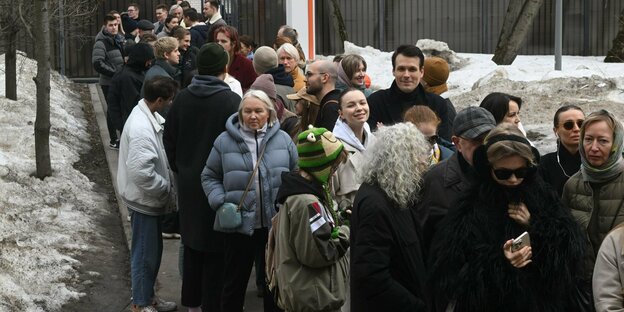In protest, thousands of people go to the polling stations at 12 o'clock. An opportunity to show her discontent, but the Kremlin has its eyes on her.

Silent protest at 12:00 in front of the polling stations: Alexei Navalny had called for it before his death Photo: Mikhail Voskresenskiy/imago
MOSCOW taz | People sneak around, look carefully around, and queue up at the Admiral Kuznetsov school in western Moscow. It's 12 o'clock in Moscow. Third day of election for a president in Russia who does not allow elections and who in the end will pompously announce the winner: Vladimir Putin, who has returned to what he has been for the last twelve years.
This election is neither free nor fair. The vote is a perfectly orchestrated measure to legitimize the existing situation. State television shows people “united against the West”, “patriots of our country”, says the moderator.
The Central Election Commission on Sunday morning reported a voter turnout of more than 60 percent, and in Chukotka, in the country's far east, it was already 80 percent, as high as the Kremlin's target six months ago. The numbers are said to be equally high in the Russian-occupied Ukrainian territories, where no one can check what happens at the polls.
The pressure is high everywhere. Government employees are offered bonuses for voting. They are threatened with losing their jobs if they do not vote “for the right person.” Soldiers, doctors, teachers and ministry employees sometimes go to the polls as a unit. Some have to send a screenshot of their electronic vote to their boss. Many people do this to avoid getting into trouble. “Anyway, everything has already been decided in the Kremlin, my vote doesn't matter,” people say then.
The country is not as closed as it seems
Everyone who lines up at the red brick building not far from Moscow's Ukrainsky Boulevard at 12:00 – families with strollers, older women and younger men – also knows that this vote is the most rigged election in the last 30 years. They know that the Kremlin calls them traitors and that the government is, at best, indifferent to their discontent.
And yet, they come, they appear here and in front of other polling stations in the country, to demonstrate exactly that: their disagreement with the politics of their country. Several opposition forces have called the action “lunch against Putin” so that those in power can see from the lines at a certain time that the country is not as closed as they like to say in their propaganda broadcasts.
About 100 people are queuing at polling station 2567. “I'm not going to vote for a murderer,” says Andrei, 43. The day before he had received a text message from the authorities telling him not to participate in the campaign. The State considers that he shows “signs of extremist activities.”
Despite the intimidation, Andrei and his wife made a conscious decision to come. “It's a flash mob, probably the last straw we can hold on to today. Starting tomorrow things will get worse, repression will increase. And who knows what else this madman from the Kremlin will come up with,” the Muscovite says in a low voice.
“I understand what our dictatorship still has in store for us”
Alexandra, now more advanced, says: “I came not to feel alone. There are hardly any places in our country where critics of the system can be found. “This is a rare legal opportunity.” Of course, at night she will be angry when she sees “the painted results of this circus,” as she describes the elections. She will probably cry too, she says: “Because I understand what our dictatorship still has in store for us.” But in the line at 12 o'clock she was able to be human and see that there weren't that many.
The five police officers who let those waiting at the polling station enter in small groups seem nervous, almost all of them are talking on the phone. The action is also a kind of sociological experiment: the Kremlin, despite all the sweetening, will closely monitor the situation, especially the actions of the dissatisfied.
The first arrests occurred shortly after noon on Sunday; The previous two days there had also been incidents because some women – the Central Commission described them as “restricted” and “traitors” – had poured paint into the ballot boxes or set voting booths on fire. She now faces up to five years in prison.
Long queues also formed in front of Russian embassies in several European capitals. The widow of opposition activist Alexei Navalny, who died in custody, Julia Navalnaya, lined up to cast her vote in Berlin. Her team did not comment on why she was there. In addition, about 800 people demonstrated there against the Russian president.